#south korea unesco sites
Explore tagged Tumblr posts
Text
What does life in North Korea look like outside of Pyongyang? 🇰🇵
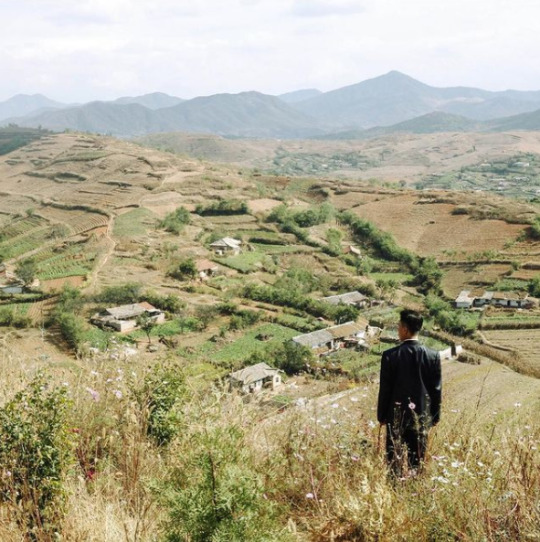
Hey, I'm back again with a very scary "tankie" post that asks you to think of North Koreans as people, and to consider their country not as a cartoonish dystopia, but as a nation that, like any other place on earth, has culture, traditions, and history.
Below is a collection of pictures from various cities and places in North Korea, along with a brief dive into some of the historical events that informs life in the so-called "hermit kingdom."
Warning: very long post
Kaesong, the historic city
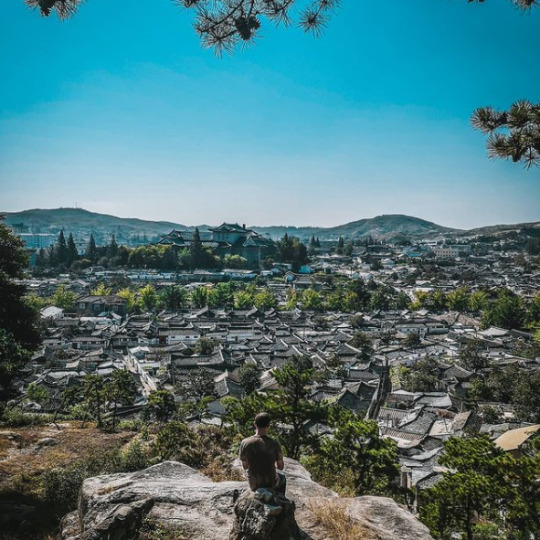
Beginning this post with Kaesong, one of the oldest cities in Korea. It's also one of the few major cities in the DPRK (i.e. "North Korea") that was not completely destroyed during the Korean war.
Every single city you'll see from this point on were victims of intense aerial bombardments from the U.S. and its allies, and had to be either partially or completely rebuilt after the war.
From 1951 to 1953, during what has now become known as the "forgotten war" in the West, the U.S. dropped 635,000 tons of bombs over Korea — most of it in the North, and on civilian population centers. An additional 32,000 tons of napalm was also deployed, engulfing whole cities in fire and inflicting people with horrific burns:
For such a simple thing to make, napalm had horrific human consequences. A bit of liquid fire, a sort of jellied gasoline, napalm clung to human skin on contact and melted off the flesh. Witnesses to napalm's impact described eyelids so burned they could not be shut and flesh that looked like "swollen, raw meat." - PBS
Ever wondered why North Koreans seem to hate the U.S so much? Well...
Keep in mind that only a few years prior to this, the U.S. had, as the first and only country in the world, used the atomic bomb as a weapon of war. Consider, too, the proximity between Japan and Korea — both geographically and as an "Other" in the Western imagination.
As the war dragged on, and it became clear the U.S. and its allies would not "win" in any conventional sense, the fear that the U.S. would resort to nuclear weapons again loomed large, adding another frightening dimension to the war that can probably go a long way in explaining the DPRK's later obsession with acquiring their own nuclear bomb.
But even without the use of nuclear weapons, the indiscriminate attack on civilians, particularly from U.S. saturation bombings, was still horrific:
"The number of Korean dead, injured or missing by war’s end approached three million, ten percent of the overall population. The majority of those killed were in the North, which had half of the population of the South; although the DPRK does not have official figures, possibly twelve to fifteen percent of the population was killed in the war, a figure close to or surpassing the proportion of Soviet citizens killed in World War II" - Charles K. Armstrong
On top of the loss of life, there's also the material damage. By the end of the war, the U.S. Air Force had, by its own estimations, destroyed somewhere around 85% of all buildings in the DPRK, leaving most cities in complete ruin. There are even stories of U.S. bombers dropping their loads into the ocean because they couldn't find any visible targets to bomb.
What you'll see below of Kaesong, then, provides both a rare glimpse of what life in North Korea looked like before the war, and a reminder of what was destroyed.
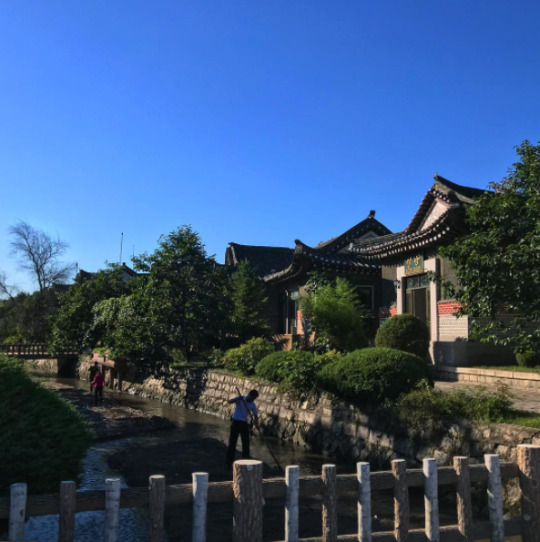
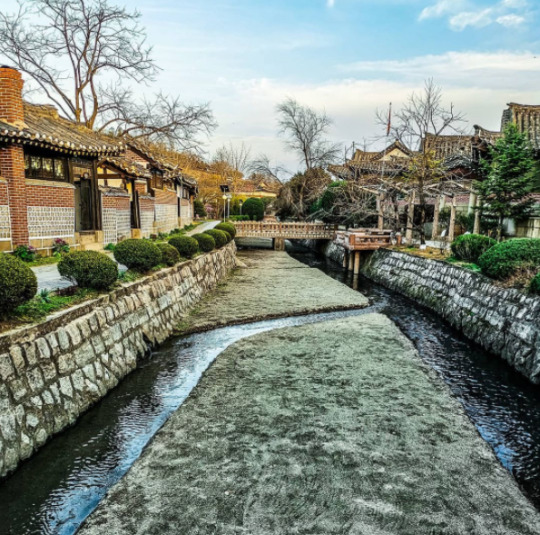
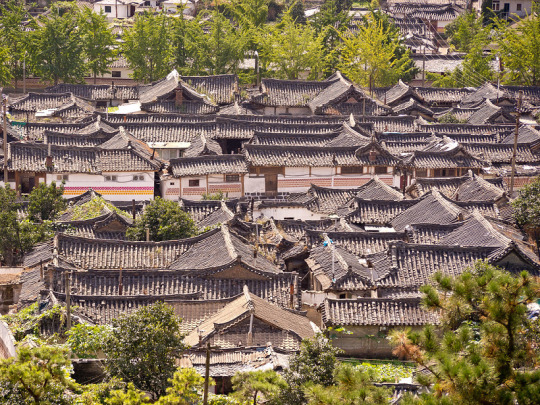
Kaesong's main street, pictured below.
Due the stifling sanctions imposed on the DPRK—which has, in various forms and intensities, been in effect since the 1950s—car ownership is still low throughout the country, with most people getting around either by walking or biking, or by bus or train for longer distances.
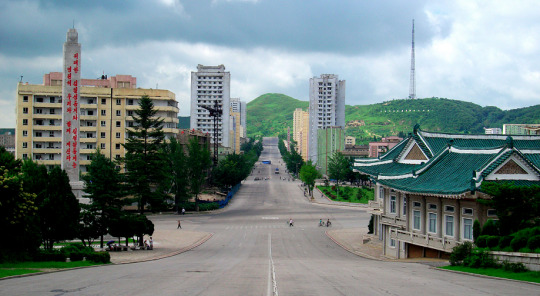
Kaesong, which is regarded as an educational center, is also notable for its many Koryŏ-era monuments. A group of twelve such sites were granted UNESCO world heritage status in 2013.
Included is the Hyonjongnung Royal Tomb, a 14th-century mausoleum located just outside the city of Kaesong.
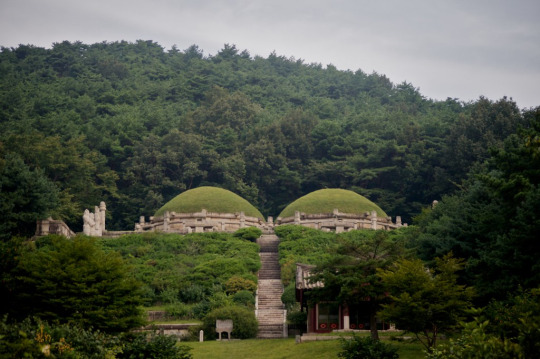
One of the statues guarding the tomb.
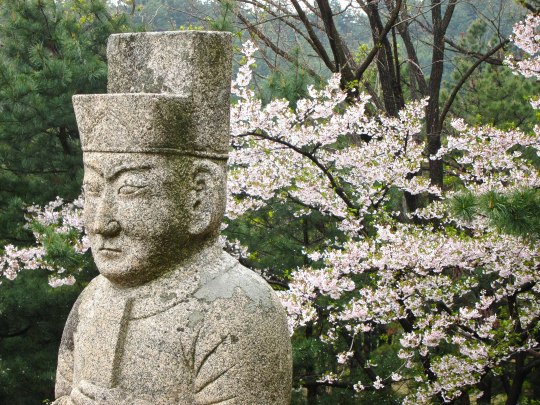
Before moving on the other cities, I also wanted to showcase one more of the DPRK's historical sites: Pohyonsa, a thousand-year-old Buddhist temple complex located in the Myohyang Mountains.
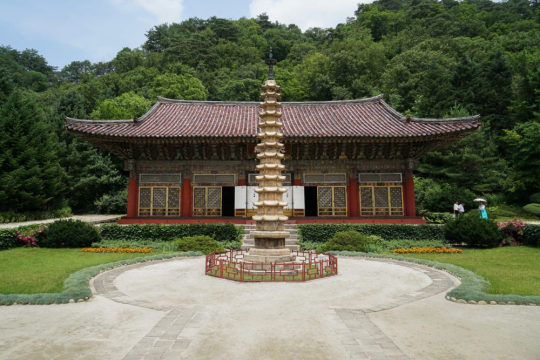
Like many of DPRK's historic sites, the temple complex suffered extensive damage during the Korean war, with the U.S. led bombings destroying over half of its 24 pre-war buildings.
The complex has since been restored and is in use today both as a residence for Buddhist monks, and as a historic site open to visitors.
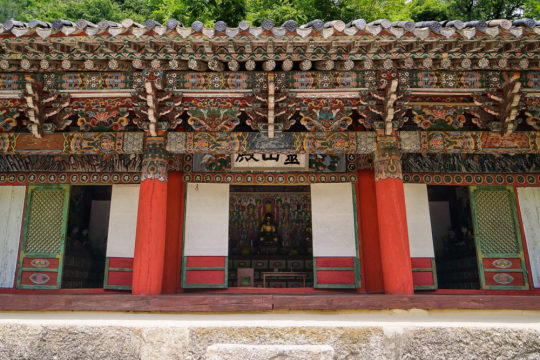
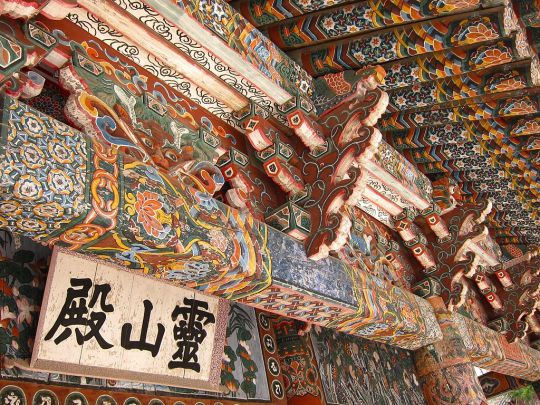
Hamhung, the second largest city in the DPRK.
A coastal city located in the South Hamgyŏng Province. It has long served as a major industrial hub in the DPRK, and has one of the largest and busiest ports in the country.
Hamhung, like most of the coastal cities in the DPRK, was hit particularly hard during the war. Through relentless aerial bombardments, the US and its allies destroyed somewhere around 80-90% percent of all buildings, roads, and other infrastructure in the city.
Now, more than seventy years later, unexploded bombs, mortars and pieces of live ammunition are still being unearthed by the thousands in the area. As recently as 2016, one of North Korea's bomb squads—there's one in every province, faced with the same cleanup task—retrieved 370 unexploded mortar rounds... from an elementary school playground.
Experts in the DPRK estimate it will probably take over a hundred years to clean up all the unexploded ordnance—and that's just in and around Hamhung.
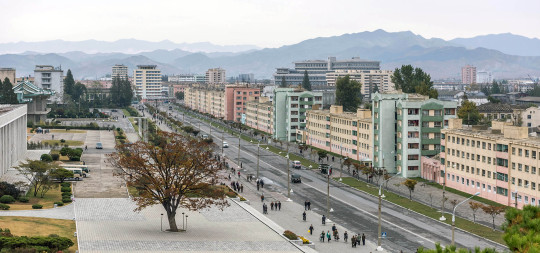
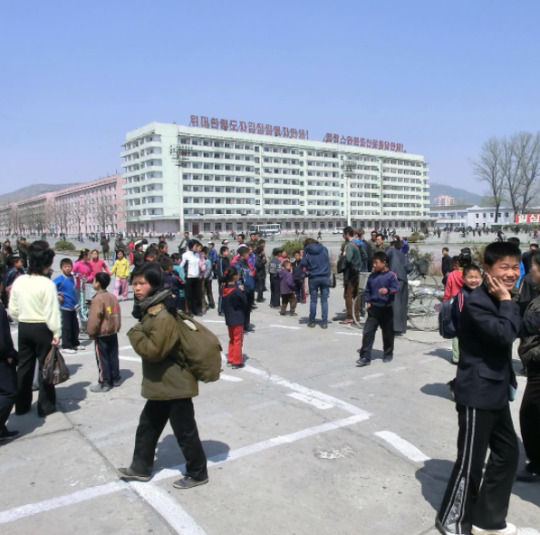
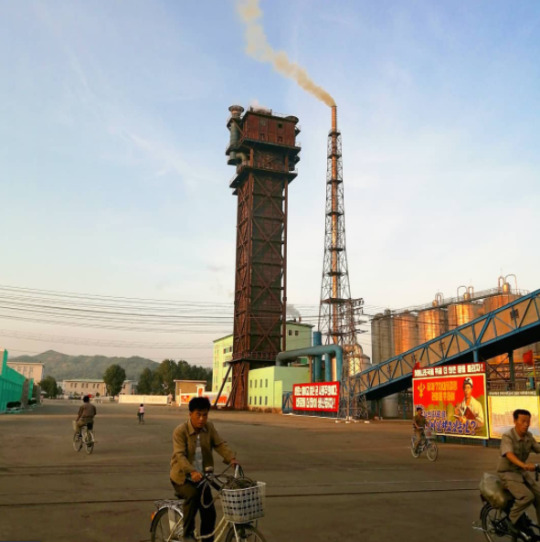
Hamhung's fertilizer plant, the biggest in North Korea.
When the war broke out, Hamhung was home to the largest nitrogen fertilizer plant in Asia. Since its product could be used in the creation of explosives, the existence of the plant is considered to have made Hamhung a target for U.S. aggression (though it's worth repeating that the U.S. carried out saturation bombings of most population centers in the country, irrespective of any so-called 'military value').
The plant was immediately rebuilt after the war, and—beyond its practical use—serves now as a monument of resistance to U.S. imperialism, and as a functional and symbolic site of self-reliance.
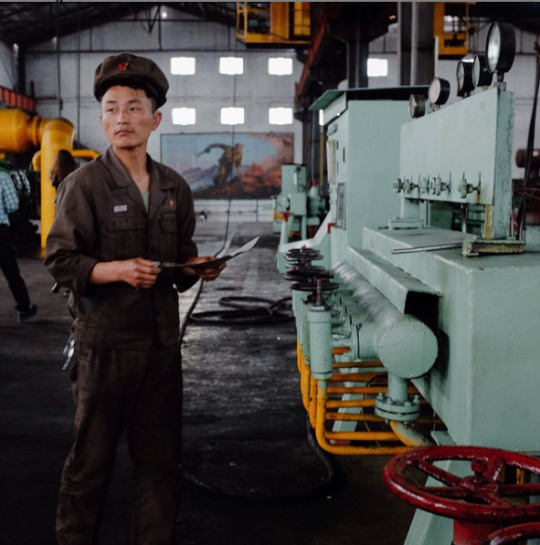
Chongjin, the third largest city in the DPRK.
Another coastal city and industrial hub. It underwent a massive development prior to the Korean war, housing around 300,000 people by the time the war broke out.
By 1953, the U.S. had destroyed most of Chongjin's industry, bombed its harbors, and killed one third of the population.
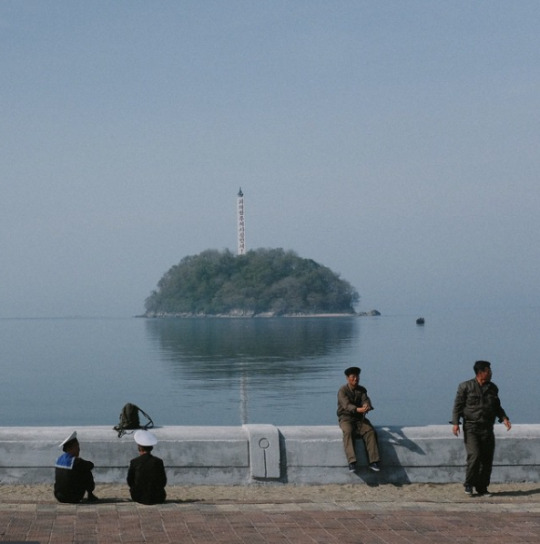
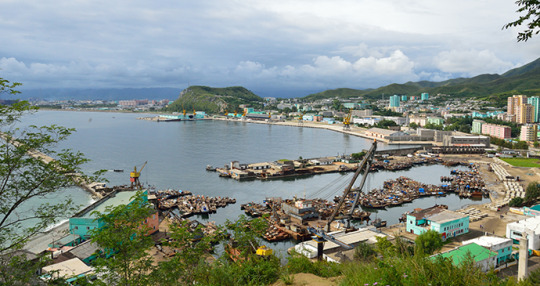
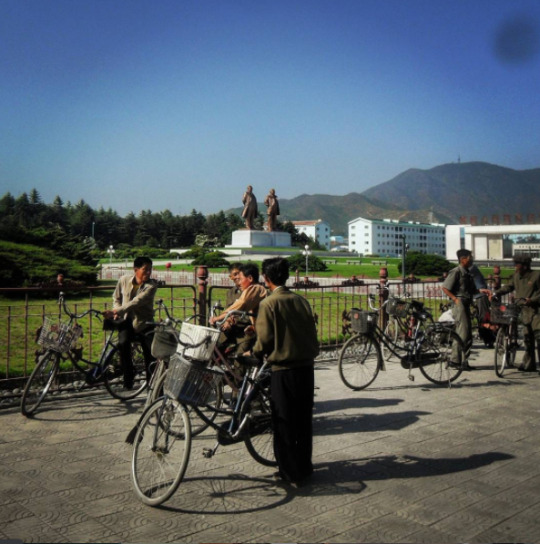
Wonsan, a rebuilt seaside city.
The city of Wonsan is a vital link between the DPRK's east and west coasts, and acts today as both a popular holiday destination for North Koreans, and as a central location for the country's growing tourism industry.
Considered a strategically important location during the war, Wonsan is notable for having endured one of the longest naval blockades in modern history, lasting a total of 861 days.
By the end of the war, the U.S. estimated that they had destroyed around 80% of the city.
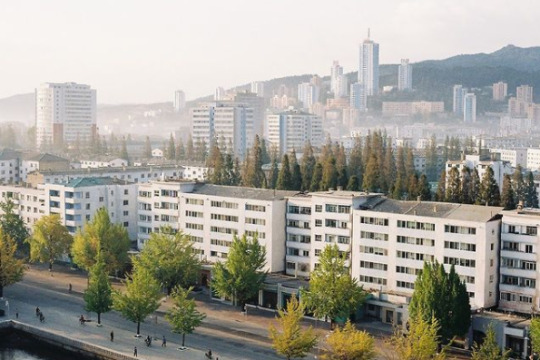
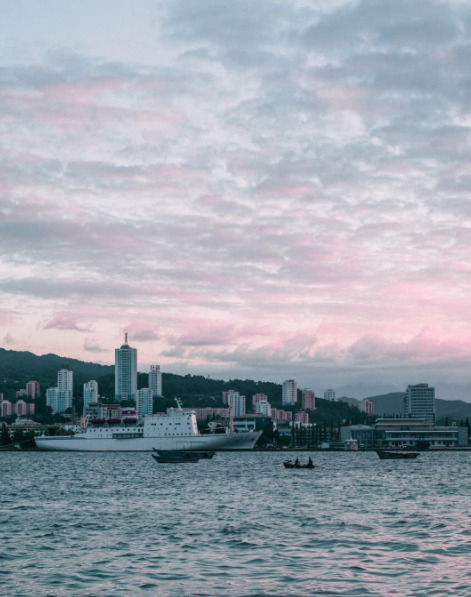
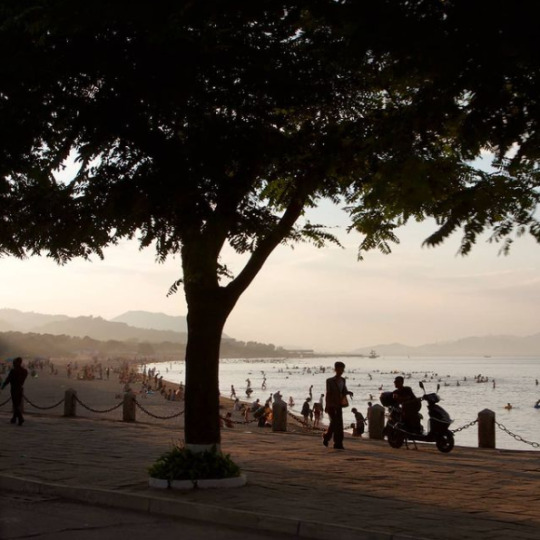
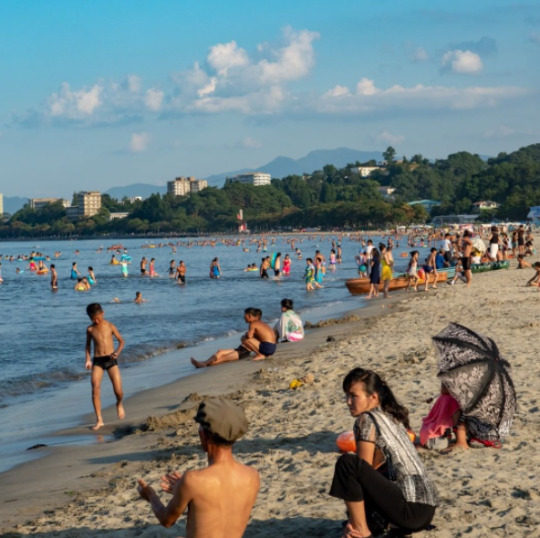
Masikryong Ski Resort, located close to Wonsan. It opened to the public in 2014 and is the first, I believe, that was built with foreign tourists in mind.
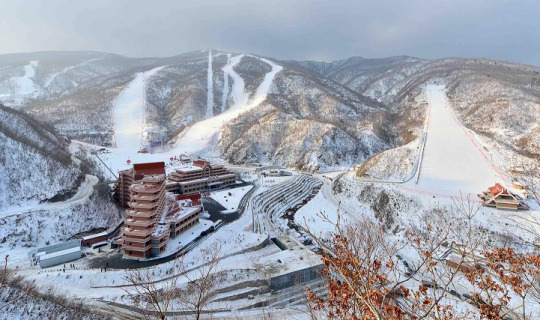
Sariwon, another rebuilt city
One of the worst hit cities during the Korean War, with an estimated destruction level of 95%.
I've written about its Wikipedia page here before, which used to mockingly describe its 'folk customs street'—a project built to preserve old Korean traditions and customs—as an "inaccurate romanticized recreation of an ancient Korean street."
No mention, of course, of the destruction caused by the US-led aerial bombings, or any historical context at all that could possibly even hint at why the preservation of old traditions might be particularly important for the city.
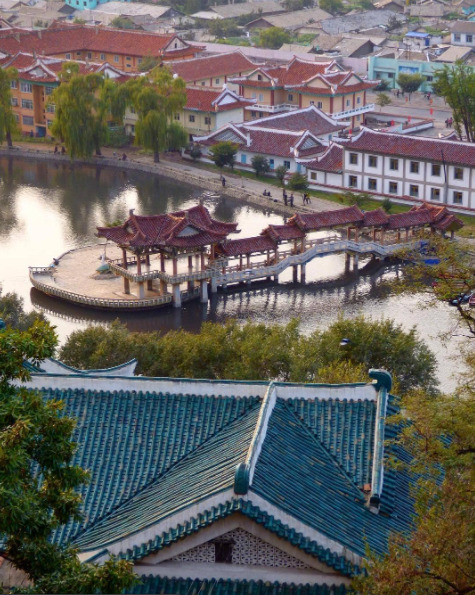
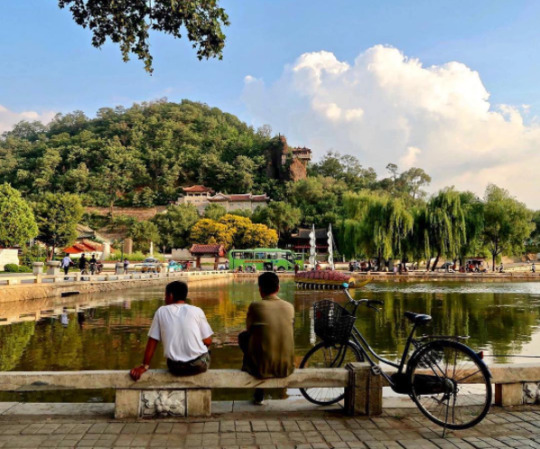
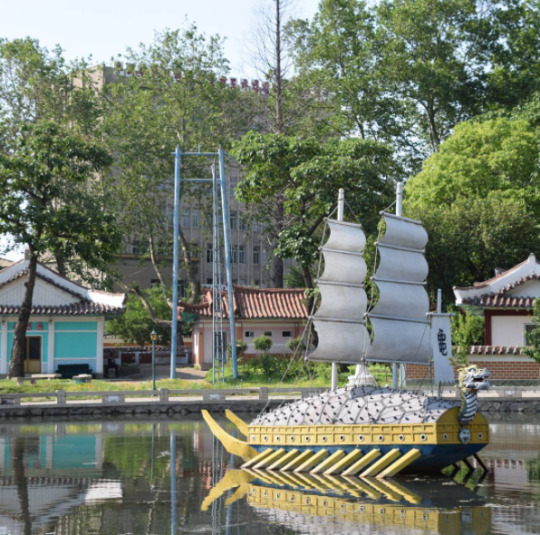
Life outside of the towns and cities
In the rural parts of the DPRK, life primarily revolves around agriculture. As the sanctions they're under make it difficult to acquire fuel, farming in the DPRK relies heavily on manual labour, which again, to avoid food shortages, requires that a large portion of the labour force resides in the countryside.
Unlike what many may think, the reliance on manual labour in farming is a relatively "new" development. Up until the crisis of the 1990s, the DPRK was a highly industrialized nation, with a modernized agricultural system and a high urbanization rate. But, as the access to cheap fuel from the USSR and China disappeared, and the sanctions placed upon them by Western nations heavily restricted their ability to import fuel from other sources, having a fuel-dependent agricultural industry became a recipe for disaster, and required an immediate and brutal restructuring.
For a more detailed breakdown of what lead to the crisis in the 90s, and how it reshaped the DPRKs approach to agriculture, check out this article by Zhun Xu.
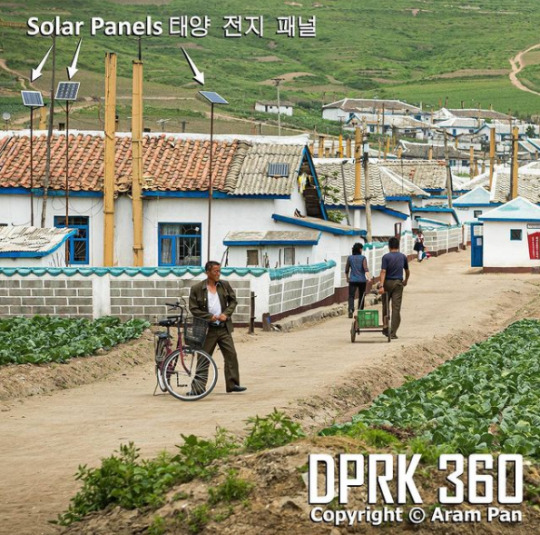
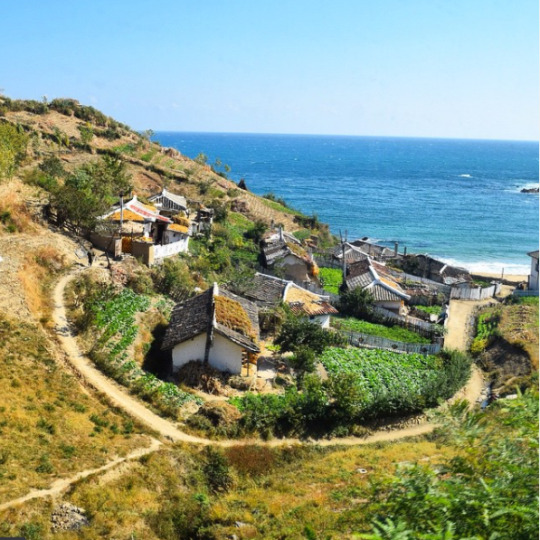
Some typical newly built rural housing, surrounded by farmland.
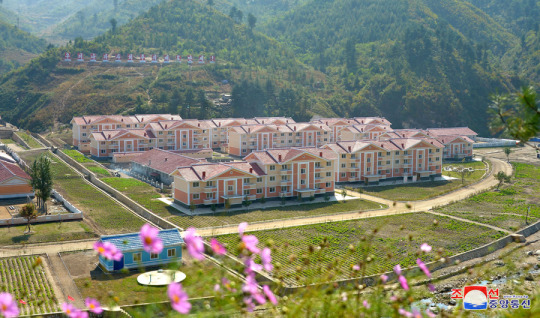
Tumblr only allows 20 pictures per post, but if you want to see more pictures of life outside Pyongyang, check out this imgur album.
#dprk#north korea#i've had this post unfinished in drafts for almost a year#also sorry about the spelling and potential formatting issues it's a nightmare to edit at this point#it was literally just meant to be a collection of picture and then the writing just sort of happened#enjoy the brief heritageposts history lesson i guess
6K notes
·
View notes
Text
Top 5 Places to visit in South Korea.🌎
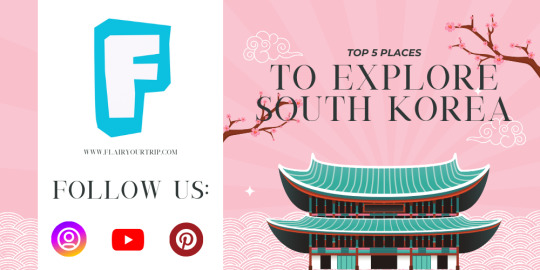
instagram
Seoul: As the capital and largest city, Seoul is a vibrant metropolis with a mix of modern skyscrapers and historic sites. Don't miss the iconic Gyeongbokgung Palace, the bustling markets of Dongdaemun, the trendy district of Gangnam, and the scenic Namsan Seoul Tower for panoramic views of the city.
Jeju Island: Known for its stunning natural beauty, Jeju Island is a volcanic island with unique landscapes. Explore the breathtaking Manjanggul Cave, hike Hallasan, South Korea's highest peak, visit the waterfalls at Cheonjiyeon and Jeongbang, and relax on the picturesque beaches.
Gyeongju: Often referred to as the "museum without walls," Gyeongju is a city steeped in history. Visit Bulguksa Temple, an UNESCO World Heritage site, explore the ancient tombs of Tumuli Park, and wander through the historic district of Hanok Village.
Busan: South Korea's second-largest city, Busan offers a mix of beaches, temples, and modern attractions. Haeundae Beach is popular for its golden sands, Jagalchi Fish Market provides a vibrant seafood experience, and Gamcheon Culture Village is a colorful hillside neighborhood filled with street art.
Incheon: As the gateway to South Korea, Incheon is not just a transportation hub but also home to interesting attractions. Explore Chinatown, visit the Incheon Grand Park, and take a stroll along the scenic Incheon Bridge. Incheon is also famous for its vibrant street food scene.
4 notes
·
View notes
Text
The Best of Jeju Island: A Traveler's Guide

South Korea's largest island, Jeju Island, covers an area of 1,833.2 km2, or 1.83 percent of its total area. It is also the most populous island in the Republic of Korea; Jeju Province will have 672,948 residents by September 2020, of whom 4,000 live on outlying islands like Chuja Island and Udo Island. Jeju Special Self-Governing Province covers 1,849 km2. Visitors to Jeju Island can also experience Korea's vibrant culture.
Enjoy ancient traditions like stone wall-making or local folk music and dance performances in the island's charming traditional villages. Outdoor enthusiasts will find plenty to do on Jeju Island. The city offers everything from hiking up Hallasan Mountain to exploring Seongsan Ilchulbong - a UNESCO World Heritage site. The scenic landscapes of Jeju Island and its vibrant culture make it a popular tourist destination. There's something for everyone on this captivating island, from secluded beaches to local customs and traditions. Take an unforgettable trip to Jeju!
Visiting Jeju Island: The Top Attractions
Its rich history and vibrant culture complement the natural beauty of Jeju Island. Experiencing Jeju's rich history and culture is a must for any traveler. Seongsan Ilchulbong, also known as Sunrise Peak, is a popular attraction. Sunrise views from this volcanic crater are spectacular. Catch this spectacular sight early in the morning! History enthusiasts should visit the Jeju Folk Village Museum. Discover traditional Jeju life through preserved houses, artifacts, and exhibits here.
Manjanggul Cave is one of the world's longest lava tunnels. Wandering through this underground wonder, you'll discover unique rock formations. An awe-inspiring experience. Yakcheonsa Temple is a stunning Buddhist temple surrounded by serene surroundings. Enjoy the tranquil atmosphere and admire the intricate architecture. Hallim Park is a must-see! An expansive park showcases historical relics and themed gardens. There are beautiful bonsai trees and traditional Korean pavilions here. Discover Jeju Island's remarkable historical and cultural sites. Its enduring beauty leaves visitors awestruck while giving a glimpse into Jeju's captivating past.
Must-Try local cuisine
Nature lovers, as well as food enthusiasts, will find Jeju Island a paradise. Its local cuisine is full of flavor and will tantalize your taste buds. Jeju Island offers something for everyone, whether you prefer seafood or meat dishes. The famous black pork barbecue on the island is a must-try. It is grilled to perfection, giving it a smoky flavor that is simply irresistible. A popular dish is Jeonbokjuk, a rice porridge with abalone, which is known for its medicinal properties.
There are many fresh seafood choices in Haemul Pajeon, including shrimp, squid, and clams. You can even get raw fish soup called Hweh Gook for those who are adventurous eaters. Hallabong oranges are perfect for sweet tooths. Jeju Island is home to these juicy citrus fruits, which are renowned for their vibrant colors and refreshing flavors. Jeju Island offers such a diverse array of culinary delights that you're sure to enjoy your gastronomic journey unlike any other.
Jeju Island Accommodation Options
Visitors to Jeju Island are spoilt for choice when it comes to accommodation. From luxurious resorts to cozy guesthouses, there is something for everyone. There are several high-end resorts on the island with stunning ocean views and world-class amenities. Spas and spacious rooms await you at these resorts, where you can unwind after exploring. Hanok guesthouses offer a more intimate experience. Unique architecture and tranquil gardens offer a unique Korean experience. Enjoy homemade breakfasts prepared by friendly hosts each morning.
Hostels and motels are also available for budget-conscious travelers in Jeju. Saving money without compromising on comfort is possible with these accommodations, which offer clean and comfortable rooms for a fraction of the price. The warm hospitality of Jeju Island awaits you wherever you stay. Locals take pride in making visitors feel welcome and ensuring they have an unforgettable experience. Jeju Island has a range of accommodation options that will meet your preferences, whether you're looking for luxury or simplicity. Don't let your trip pass you by!
Jeju Island Travel Tips
Plan: Jeju Island is a popular tourist destination during peak seasons. Plan and book accommodations and attractions in advance to make the most of your visit.
Don't overpack: Jeju Island has a mild climate year-round, but it can be unpredictable. Depending on the time of day, layers are recommended. Wear comfortable shoes for exploring, and bring a rain jacket or umbrella.
Take public transportation or rent a car: The island offers public transportation, but renting a car lets you go at your own pace. This option requires an international driver's license.
Acquire some basic Korean phrases: Speaking some basic Korean phrases can go a long way in communicating and showing respect for the local culture on Jeju Island.
Maintain nature: Jeju Island is home to stunning natural beauty and UNESCO World Heritage sites. Don't disturb wildlife, follow designated paths, and dispose of trash properly.
Enjoy local cuisine: The island's unique culinary offerings include black pork BBQ, seafood stew, and abalone porridge.
Understand and respect cultural differences: Like any travel experience, it is important to approach it open-mindedly.
2 notes
·
View notes
Video
youtube
South Korea Travel Tips
There's a persistent idea that there lies an omnipresent energy that flows throughout the Korean mountains, providing the extremely existence source of Korean culture and spirituality all through its history - the trust was not with out basis. The South Korean geography is mostly mountainous, about seventy percent in the 100,032 sq. meter acreage is covered with mountain ranges. It really is no surprise that the pre-Buddhist Korean civilizations would revere the mountains. They derive spiritual strength from its animistic chi, ever flowing, and spawning exclusive Korean customs, traditions and festivals.
Accordingly, The UNESCO lists large amount of these mountainous terrains as Globe Pure Heritage Websites like the Jeju-do volcanic tropical isle, Seongsan Ilchulbong peak, and also the Mount Hallasan Natural Reserve. Normal scenic spots such as these form the core of any South Korean travel destinations but of course, that this technologically superior, yet culturally rich country has a lot more to provide for those intending to make a stop by.
Summer is invariably a good time to visit South Korea and the optimum time to hit the seashore this time of the year is from July to August where the temperature can get as tall as 30 degrees Centigrade or more. A few of the well-known beaches are the Sokcho beach in Ganneung-si, Naksan Seashore in Yangyang-gun and Guryongpo Beach in Pohang-si. They all face the East Sea - identified for its pristine waters and encompassing white sandy beaches, making it a fashionable vacation spot.
Historical and cultural landmarks can be observed during South Korea and also the most striking of those are found in the capital city, Seoul such as the Amsa-dong Prehistoric Settlement Web site, the "Five Grand Palaces" as well as the "Castle Walls of Seoul"- the remaining walls of Seoul from your historic Joseon Dynasty that practically left an important legacy on the modern face of South Korea.
Endless words are not sufficient to explain the beauty and splendor of South Korea. One has to take the plunge to touch the water, and to be left with his own devices to explore, to see and to marvel. True for the South Korean expression "san neomeo san" - over the mountain is a mountain, or just merely, "there can be a surprise within a surprise".
5 notes
·
View notes
Video
youtube
The Best Reasons to Visit Seoul
Seoul is one of the world's largest cities and the capital of South Korea. The city with more than 10 million people is the political, cultural and economic center of South Korea. The vibrant city with 4 UNESCO World Heritage Sites and numerous museums as well as grand Shopping plazas, markets, restaurants and skyscrapers is a preferred tourist destination. This is an overview of Seoul's major tourist attractions.
Gyeongbok Palace located in Seoul's major avenue, Sejongro is the most popular royal palace of the country. The grand palace built in the 1300s, later destroyed and restructured many times, has magnificent arched gates, gorgeous pavilions and halls featuring Korea's architectural beauty. Changdeokgung Palace is another famous Seoul palace and this 15th century historic palace encompasses beautiful buildings, secret gardens and castles. Walk through the Bukchon Village, a scenic area that has numerous conventional Korean wooden homes 'hanok'. Stroll down the alleys with architectural courtyards, beautiful outer walls and tiled roofs. It has also many old-fashioned cafés, restaurants and popular art galleries.
Shinsegae Department Store is one of the most popular shopping centers in Seoul. You will get all types of products here including fresh fish, fruits, traditional foods like kimchi, brand name shoes, cloths and more, arranged on different floors. Lotte and Hyundai stores are the other two big centers and the food court of Lotte is also notable. Bugaksan is the peak near the Blue House and is an ideal place for hiking. It offers a fantastic view of the city at a height of 342 meters. Here you can take-in Seoul's ancient fortress and many scenic areas nearby. National Museum of Korea that holds more than 220, 000 objects is the largest in the country. It has vast exhibition halls, 6 permanent display galleries, a children's museum, restaurants and more. Leeum Samsung Museum of Art is another best-known museum and is notable for its wonderful architecture and impressive collection.
Itaewon neighborhood close to the U. S. Army base is very popular among foreign tourists. This expatriate-friendly area has numerous trendy clubs, bars, restaurants and shops that sell various products. Club Volume featuring the best DJs and French café Le Saint Ex are particularly notable and enjoy a dinner at Kate's Kitchen. Trip Insadong, the famed cultural art market and view its great collection of Korean paintings, sculptures and more. Stroll along the beautiful, 5. 8 km long Cheonggyecheon Stream to enjoy the natural beauty and relax. The calm stream is 15 ft. below street level and has many petite falls and overhead bridges to enjoy.
Round-the-clock Namdaemun market is the busiest market that has thousands of shops arranged in many multi-story buildings, countless vendor booths and food stalls offering traditional cuisine. The vibrant street is the best to buy a range of items at incredibly low prices. The War Memorial of Korea is actually an enormous military museum and is a must visit for history buffs. The renowned memorial that holds planes, guns and tanks narrates the history of wars the country had fought with many of its enemies, but mainly its neighbor North Korea.
4 notes
·
View notes
Text
Discovering the Beauty of Korea: An In-Depth Travel Guide
Korea is a small yet vibrant country located in East Asia, known for its rich history, delicious food, and beautiful landscapes. Whether you're interested in exploring ancient temples and palaces, trying traditional Korean cuisine, or simply soaking up the local culture, there's something for everyone in Korea.
One of the best ways to experience Korea is by visiting its many historical and cultural sites. The ancient city of Gyeongju, for example, is home to a wealth of historical treasures, including the impressive Bulguksa Temple, a UNESCO World Heritage Site. The temple features intricate carvings and beautiful pagodas, and is considered one of the most important Buddhist monuments in Korea. The temple is surrounded by a beautiful forested area and visitors can hike to the temple, along the walk visitors can enjoy the natural beauty of the area and also see other smaller temples.
Another must-see destination for history buffs is the city of Seoul, the capital of South Korea. Here, you can visit the impressive Gyeongbokgung Palace, a royal palace from the Joseon Dynasty. The palace is a beautiful example of traditional Korean architecture and visitors can take a guided tour to learn more about the history of the palace and the Joseon Dynasty. Visitors can also see the changing of the guard ceremony, which is held in the palace courtyard. In addition, the palace is surrounded by beautiful gardens and visitors can take a stroll around the palace to see the gardens. Visitors can also walk along the ancient city walls of Hwaseong Fortress, which is an impressive fortress that surrounds the city of Suwon. The fortress offers beautiful views of the city and visitors can take a guided tour to learn more about the history of the fortress.
Korea is also famous for its delicious food, from traditional dishes such as kimchi and bibimbap, to modern fusion cuisine. Be sure to try some of the local specialties during your visit, such as samgyeopsal (grilled pork belly) or japchae (stir-fried glass noodles). Korean cuisine is known for its use of fermented ingredients, such as kimchi and soy sauce, which gives the dishes a unique and delicious flavor. Visitors can also try traditional Korean drinks such as makgeolli, a rice wine, and soju, a distilled spirit.
In addition to its rich history and delicious food, Korea is also known for its picturesque landscapes. Take a trip to Jeju Island, a volcanic island located off the southern coast of the Korean Peninsula, known for its beautiful beaches, lush forests, and scenic hiking trails. Jeju Island is a popular destination for outdoor enthusiasts and visitors can hike to the top of the island's highest peak, Hallasan Mountain, which offers beautiful views of the island. Visitors can also visit the island's many waterfalls, such as Jeongbang Waterfall, which is the only waterfall in Asia that falls directly into the ocean. Visitors can also visit the island's many beaches, such as Hyeopjae Beach, which is known for its beautiful white sand and clear blue water.
Overall, Korea is a fascinating and diverse country with something to offer every traveler. Whether you're interested in history, culture, food, or nature, you're sure to find something that you'll love in Korea. It's a country that will surprise you with its beauty and culture and will leave a lasting impression on you.
youtube
3 notes
·
View notes
Text
Explore the Majestic Palaces of Seoul: A Glimpse into Korea’s Royal Legacy

Seoul, the vibrant capital of South Korea, stands as a testament to a harmonious blend of modernity and tradition. Among its many cultural treasures, the five grand royal palaces offer a captivating journey into the rich history of the Joseon Dynasty. These architectural masterpieces not only embody Korea’s royal heritage but also provide visitors with a serene escape from the city’s bustling energy. Here, we delve into the splendor of these palaces and why they’re an essential part of any itinerary, especially for those exploring South Korea holiday packages from Dubai.
1. Gyeongbokgung: The Grand Palace
Gyeongbokgung, or the "Palace of Shining Happiness," is the largest and most iconic of Seoul’s royal palaces. Built in 1395, it served as the main royal residence during the Joseon Dynasty. Visitors can marvel at its grand throne halls, intricate architecture, and the scenic Gyeonghoeru Pavilion. Passing through the majestic Gwanghwamun Gate sets the tone for an unforgettable historical exploration.
Don’t miss the daily changing of the guard ceremony, a vivid display of traditional Korean culture and royal protocol.
2. Changdeokgung: A UNESCO World Heritage Site
Recognized as a UNESCO World Heritage Site, Changdeokgung Palace is celebrated for its seamless integration with nature. The palace’s Secret Garden (Huwon) is a highlight, offering picturesque landscapes, lotus ponds, and pavilions that exude tranquility. The palace’s architecture and natural surroundings reflect the Confucian philosophy that shaped Korea’s cultural and political landscapes.
3. Deoksugung: A Blend of East and West
Deoksugung Palace is the smallest of the five palaces but is perhaps the most unique. Its striking combination of traditional Korean architecture and Western-style buildings makes it a fascinating site. The palace grounds also host the National Museum of Modern and Contemporary Art, providing an additional layer of cultural insight.
Evening visits to Deoksugung are magical, as the palace is beautifully illuminated, offering a romantic ambiance for visitors.
4. Gyeonghuigung: The West Palace
Known as the "Palace of Serene Harmony," Gyeonghuigung served as a secondary palace for the royal family. Though simpler in design compared to its counterparts, its peaceful gardens and historical significance make it a hidden gem for those seeking a quieter, more contemplative experience.
5. Changgyeonggung: A Palace of Legacy
Originally built for Crown Prince Sado, Changgyeonggung Palace boasts architectural brilliance and a rich history. The palace is well-preserved, allowing visitors to step back in time and envision life during the Joseon Dynasty. The surrounding grounds include a greenhouse and arboretum, adding to its charm.
Why Visit Seoul’s Palaces?
Seoul’s palaces are more than just historical landmarks; they are windows into Korea’s royal past and cultural identity. Each palace offers unique insights into the artistry, philosophy, and lifestyle of the Joseon Dynasty. Whether you’re strolling through tranquil gardens or admiring intricate architectural details, these palaces promise an enriching experience.
For travelers seeking comprehensive South Korea holiday packages, including visits to these royal sites ensures a deeper connection to the country’s heritage. If you’re embarking on South Korea holiday packages from Dubai, make sure to include these majestic palaces in your itinerary for an unforgettable journey.
#SouthKoreaTravel#SeoulPalaces#KoreanHistory#TravelToSeoul#JoseonDynasty#CulturalHeritage#ExploreKorea#SouthKoreaHolidayPackages#TraditionalArchitecture#VisitSeoul
0 notes
Text
Magic of Da Nang: A Paradise for Photographers in South Korea - fernandesphotography.vn
Magic of Da Nang: A Paradise for Photographers Nestled on Vietnam's stunning central coast, Da Nang is a photographer's dream and an unforgettable escape for those in South Korea seeking beauty, culture, and inspiration. Known for its harmonious blend of natural wonders, vibrant cityscapes, and rich heritage, Da Nang offers endless opportunities to capture magic through your lens. From the ethereal beauty of the Golden Bridge, where giant stone hands cradle a shimmering walkway in the clouds, to the serene beaches of My Khe, every corner of this city tells a visual story. Photographers will find the charm of Hoi An Ancient Town irresistible—a UNESCO World Heritage site just a short drive away. Its lantern-lit streets and colorful markets paint a perfect scene for portraits and landscapes alike. Adventure seekers can capture the dramatic cliffs and sweeping views of Son Tra Peninsula, while the mystical Marble Mountains provide awe-inspiring caves, pagodas, and panoramic shots. As the sun sets, Da Nang comes alive with dazzling lights along the Dragon Bridge, an iconic spectacle of modern design. For South Korean travelers and photographers, Da Nang’s accessibility, affordable luxury, and warm hospitality make it the perfect paradise. Whether you are a professional seeking breathtaking shots or a hobbyist capturing memories, Da Nang promises magic at every frame. Discover the visual wonder of Vietnam’s coastal gem and let Da Nang inspire your creativity. Visit fernandesphotography.vn for more stunning photography tips and destination guides! contact info Adress - 97 Nguyen Luong Bang – Hoa Khanh Bac – Lien Chieu – Da Nang whatsapp no - +84935344522 Fanpage: Fernandes Studio Instagram: fernandes_photographer Email - [email protected]
0 notes
Text
Visit Saudi Visa: Everything You Need to Know Before Your Trip

Title: Visit Saudi Visa: Everything You Need to Know Before Your Trip
Visit Saudi Visa: Your Complete Guide to a Smooth and Memorable Journey
In the recent past, Saudi Arabia has emerged as a popular destination to visit for tourists across the globe. Be it from old heritage to advanced cities and breathtaking landscapes, the Kingdom has everything to satisfy its visitors. Before all that fun and experience from the land of Saudi Arabia, you first have to get a Visit Saudi Visa. This is the ultimate guide to the application process, visa types, requirements, and some tips to ensure a safe journey into the Kingdom.
1. Why Visit Saudi Arabia?
Saudi Arabia is a melting pot of different cultural richness, stunning architectures, and beautiful landscapes. The Kingdom has now opened up to tourism and people are excited to explore this marriage of old times history and modern development. Some attractions include:
Historical Sites: Observe the ancient Mada'in Saleh ruins declared as World Heritage by UNESCO and Diriyah is the Saudi state's birthplace.
Natural Wonders: There are striking dunes of sand in the Empty Quarter, mountainous regions of Asir, and beaches along the Red Sea.
Vibrant cities-Vibrant modern high-rise buildings of the capital city Riyadh, a pleasant blend of old and new from Jeddah.
Cultural Experiences: Saudi Arabia offers extremely rich cultural experiences-from the traditional souks to delectable food, vibrant colorful festivals.
2. Types of Visit Saudi Visas
There are various needs for traveling in Saudi Arabia and thus different visas and their respective types used for a particular purpose over various durations. Knowing which of these applies to you is essential:
Tourist Visa: This is the most universal visa for traveling leisure. It allows you to enter the country for tourism, family visits, and other activities non-related to work. The majority of tourists apply for this one-year multiple-entry visa with each stay limited to 90 days.
Business Visa: This kind of visa is suitable for visiting Saudi Arabia in order to conduct business meetings or attend exhibitions and conventions. It might either be a single entry or a multiple entry kind of visa.
Transit Visa: The transit visa is intended for a traveler crossing through Saudi to reach another destination. Transit visa is recommended to stay temporarily in the Kingdom.
Family Visit Visa: Second, there is the Family Visit Visa for those who want to visit their family members in Saudi Arabia. This often requires a family member in Saudi Arabia to sponsor your application.
3. Procedures for Issuance of A Visit Saudi Visa
In fact, applying for a Visit Saudi Visa is now pretty much simplified, and today most travelers can apply online. Here's how you can do it step by step:
Step 1: Check Eligibility
Ensure that the country you are visiting is eligible for the Visit Saudi Visa. An eVisa can be applied for online through the government's website by citizens of almost 49 countries; these countries include the United States, Canada, most countries in Europe, Japan, South Korea, China, and many more. If your country is not eligible for an eVisa, you would have to apply through the nearest Saudi consulate.
Step 2: Collect all Documents Needed
You will require a couple of documents before beginning the process. These usually are:
A valid passport: This document should remain valid for at least six months after the date of planned entry.
Passport photocopy: Recent photographs according to Saudi Arabia's specifications for passport photographs.
Travel insurance: You are required to purchase in Saudi Arabia; it is mandated for all that cover any emergency occurring during your visit.
Credit or debit card: To pay for the application fee of the visa.
Step 3: Apply Online
If you are eligible for apply saudi visa, you can start your procedure by visiting the official Visit Saudi eVisa portal located at https://visa.visitsaudi.com/. There, you will see a special field in which you will be required to enter all necessary information, upload your documents, and pay the visa charge. Normally, the process of obtaining an eVisa takes only several minutes, and your visa might be sent to your email within less than hours.
Step 4: Obtain Your Visa
Once your application is accepted, you shall receive an eVisa. Print out a copy of it and keep a soft copy in your phone so as to present it upon arrival in Saudi Arabia.
Saudi Arabia 90 Days Multiple Entry Visa Process
Open the Visit Saudi Visa Application
Choose your citizenship and country of residence.
Select your preferred visa type, like Saudi 90 Days Multiple Entry Visa.
Complete the application form and fill in all the details carefully.
Upload the required documents.
Make the visa payment.
Receive your Saudi Visa in 2-3 Working Days via Email or WhatsApp. You can track your Saudi Visa Status here.
Once approved, the visa details are sent to the airline you've booked your flight with. The airline then verifies your visa and, if everything is in order, updates your booking with an "OK to Board" status.
Visit Saudi Visa Fees
Depending on whether one goes for the regular or express service, adding other services to the Saudi Arabia visit visa cost for 90 days will incur fees. The fees are structured, and all other services affect the cost positively as they are designed for quick approval.

Conclusion
In short, getting the Visit Saudi Visa is a process as easy as knowing you are introduced to deep heritage, crystal clear cut lands, and the rich culture of Saudi Arabia. Once all these are in check, you know your papers are in order and in line, you will definitely have the most memorable, congestion-free experience while in the Kingdom.
0 notes
Text
Experience the Wonders of South Korea with Sammelan Tour & Travels

South Korea is a captivating blend of rich history and modern innovation, offering travelers an array of unforgettable experiences. If you're ready to explore this vibrant country, look no further than Sammelan Tour & Travels for customized South Korea travel packages tailored to your interests. From dynamic city life to serene countryside, your adventure awaits!
Why Choose Sammelan Tour & Travels?
At Sammelan Tour & Travels, we understand that each traveler's journey is unique. Our South Korea vacation deals are designed to provide exceptional value, allowing you to experience the best of Korea without overspending. Whether you’re interested in a short trip or a deep cultural dive, our flexible packages ensure an unforgettable experience.
Top Destinations to Discover in South Korea
1. Seoul: The Heart of the Nation
Seoul, the energetic capital, is a must-visit destination. This city is a fascinating mix of ancient traditions and cutting-edge technology. Don’t miss Gyeongbokgung Palace, where you can witness the stunning changing of the guard. For an authentic local experience, visit Myeongdong, renowned for its street food and eclectic shops.
2. Busan: Coastal Charm
For those who love the sea, Busan is the perfect escape. This coastal city is home to picturesque beaches like Haeundae and cultural landmarks such as Beomeosa Temple. Participate in our South Korea cultural tours to delve into Busan’s rich history while enjoying its delicious seafood.
3. Gyeongju: A Journey Through History
Known as the “museum without walls,” Gyeongju is steeped in history. Explore UNESCO World Heritage sites like Bulguksa Temple and Seokguram Grotto, where ancient artistry comes to life. With our expert South Korea tour guides, you’ll uncover the fascinating stories behind these historic sites.
4. Jeju Island: A Natural Haven
Jeju Island is famous for its stunning natural beauty, including lush landscapes, waterfalls, and volcanic features. Hike to the summit of Hallasan, the highest mountain in South Korea, and savor the island’s unique culinary offerings, including fresh seafood and local specialties.
The Benefits of Having a Local Guide
Exploring a new country can be daunting, but our skilled South Korea tour guides enhance your experience with their local insights. They provide valuable context on customs, history, and dining recommendations, ensuring you make the most of your journey. Their expertise will help you connect deeply with South Korean culture.
Cultural Experiences You Won't Want to Miss
1. Experience Traditional Hanbok
Engage with South Korean culture by wearing a Hanbok, the traditional dress. Many historic sites offer rental services, letting you immerse yourself in local tradition while capturing beautiful memories.
2. Explore K-Pop and Culinary Delights
No visit to South Korea is complete without indulging in its famous cuisine. Join our food tours to taste beloved dishes like Bibimbap and Korean BBQ. K-Pop fans should also explore entertainment companies or catch a live performance for an unforgettable experience.
3. Join Vibrant Local Festivals
Time your visit to coincide with one of South Korea’s lively festivals, such as the Cherry Blossom Festival in spring or the Busan International Film Festival in the fall. These events provide an excellent opportunity to connect with the local community and immerse yourself in the culture.
Discovering the Best Travel Deals
Sammelan Tour & Travels is committed to helping you find the best South Korea vacation deals. Our all-inclusive packages cover everything from flights and accommodations to guided tours and cultural experiences, making travel planning simple and enjoyable. Plus, our flexible itineraries allow for personalized exploration.
Conclusion
South Korea offers a unique blend of adventure, culture, and lasting memories. With Sammelan Tour & Travels, you’ll discover the best places to visit in South Korea while engaging meaningfully with its rich culture
Start planning your South Korean adventure today! Browse our exclusive travel packages and let us help you create unforgettable experiences. For inquiries and bookings, visit our website or reach out to us directly. Your remarkable journey in South Korea is just a step away!
#South Korea travel packages#south korea tour guide#south korea vacation deals#south korea cultural tours#best places to visit in South Korea
0 notes
Text
Top Must-See Destinations on Korea Tours
South Korea is a vibrant country where ancient traditions blend seamlessly with modern advancements. From bustling cities to serene landscapes, a tour of Korea offers a rich tapestry of experiences. Whether you’re drawn to historical sites, natural beauty, or contemporary culture, South Korea has something for everyone. Here’s a guide to the top 10 must-see destinations that should be on Korea tours.
Seoul: The Heart of Modern Korea
As South Korea’s capital, Seoul is a dynamic city that blends tradition with innovation. Visit Gyeongbokgung Palace, a stunning example of traditional Korean architecture, and explore Bukchon Hanok Village to see well-preserved Hanok houses. For a taste of modern Seoul, stroll through Myeongdong’s bustling shopping streets or enjoy panoramic views from N Seoul Tower.

Busan: Korea’s Coastal Gem
Busan, Korea’s second-largest city, is famous for its beautiful beaches and vibrant port. Haeundae Beach is perfect for a relaxing day by the sea, while Gamcheon Culture Village offers colourful art installations and stunning views. Don’t miss the Jagalchi Fish Market, where you can sample fresh seafood and experience local culinary traditions.
Gyeongju: The Ancient Capital
Often referred to as “the museum without walls,” Gyeongju is a city steeped in history. Once the capital of the Silla Kingdom, it is home to ancient temples, tombs, and palaces. Key sites include Bulguksa Temple and Seokguram Grotto, both UNESCO World Heritage Sites, offering a glimpse into Korea’s rich cultural heritage.

Incheon: Gateway to Korea
Incheon, Korea’s major port city, is more than an airport hub. Visit Chinatown for a unique blend of Korean and Chinese cultures, or explore Songdo Central Park, a modern urban oasis. Incheon is also home to the beautiful Incheon Grand Park, perfect for leisurely walks and picnics.
Andong: A Glimpse into Traditional Korea
Andong is known for its well-preserved traditional Korean culture. The Andong Hahoe Folk Village offers a peek into historic Korean life with traditional homes and festivals. The city is also famous for its Andong Soju and rich culinary traditions.
Jeonju: The Culinary Capital
Jeonju is celebrated for its delicious Korean cuisine, particularly its bibimbap. Explore the Jeonju Hanok Village, where traditional Korean architecture is preserved, and enjoy local specialities at the city’s vibrant food markets. Jeonju’s rich culinary heritage makes it a must-visit for food lovers.

Suwon: Fortress City
Suwon is known for its impressive Hwaseong Fortress, a UNESCO World Heritage Site. The fortress walls, gates, and towers offer a fascinating glimpse into Korea’s defensive architecture. Explore the surrounding area, including traditional Korean street food markets and cultural sites.
Chuncheon: The Lake City
Chuncheon, located near scenic lakes and mountains, is famous for its natural beauty and local cuisine. Enjoy a boat ride on Lake Uiam or visit Nami Island, known for its picturesque landscapes and tree-lined paths. Chuncheon’s dakgalbi (spicy stir-fried chicken) is a local speciality you won’t miss.

Pyeongchang: A Winter Wonderland
Pyeongchang, the host of the 2018 Winter Olympics, is a prime destination for winter sports enthusiasts. Ski resorts like Yongpyong and Alpensia offer world-class facilities for skiing and snowboarding. In the off-season, Pyeongchang’s beautiful natural scenery and hiking trails provide a tranquil escape.
South Korea offers a diverse range of destinations that cater to all interests, from historical landmarks and cultural experiences to natural wonders and modern attractions. It is wise to be with Kim’s M&T, a reputed Korea tour operator to enjoy these places. Call +82 2 570 3500 to know about the tours.
1 note
·
View note
Photo
Dolmen, a type of stone monument found in a variety of places throughout the world. Dolmens are made of two or more upright stones with a single stone lying across them. The most widely known dolmens are found in northwest Europe, notably in the region of Brittany, France; southern Scandinavia; Britain; Ireland; and the Low Countries. The term dolmen is also used in relation to sites in central and southern Europe, particularly central and southern France, the Iberian Peninsula, Switzerland, Italy, and islands in the Mediterranean. Dolmens are also known from parts of Africa and Asia. More than 30,000 such monuments, making up some two-fifths of the world’s total, are in Korea alone, and in 2000 three of the Korean dolmen sites—at Koch’ang (Gochang), Hwasun, and Kanghwa (Ganghwa) in South Korea—were designated UNESCO World Heritage sites.

A prehistoric dolmen located near the Black Sea coast in Russia
#history#prehistory#architecture#tombs#burials#neolithic#france#russia#korea#south korea#bretagne#black sea#dolmen#prehistory ref#dolmen ref
174 notes
·
View notes
Text
Bucket list in my late 20s
Updated list of things I want to cross out before I d-word. This serves as both an inspiration and reminder for me to work hard and enjoy the fruits of my hard work.
Local (Philippines)
Explore Palawan - Visit the Underground River and take a boat tour in El Nido.
Island-hop in Siargao - Relax on the white sand beaches and visit the Sugba Lagoon.
Visit Ilocos Sur and Ilocos Norte - Wander through the cobblestone streets of this UNESCO World Heritage Site.
Relax in Tagaytay - Enjoy the view of Taal Volcano from a cozy café.
Explore Intramuros, Manila - Discover the historic walled city and its Spanish-era landmarks.
Visit Davao's Eden Nature Park - Stroll through gardens and enjoy panoramic views.
Explore Batanes - Experience the serene landscapes and traditional Ivatan houses.
Visit the Chocolate Hills in Bohol - Marvel at these unique geological formations and check on the Tarsier sanctuaries.
Explore Cebu’s Historic Sites - Visit Magellan's Cross, Fort San Pedro, and Temple of Leah and more.
Attend the Sinulog Festival in Cebu - Experience vibrant street parades and cultural performances.
Visit Sagada - Experience the serene mountain scenery, explore the Hanging Coffins, and unwind in Echo Valley.
Tour the Banaue Rice Terraces - Marvel at these ancient terraces and learn about the Ifugao culture.
Visit a traditional Ifugao village - Learn about indigenous customs and crafts.
Watch an indie film at the Cinematheque Centre Manila - Explore local cinema.
Join a local pottery-making workshop - Create your own clay masterpiece.
Attend a Filipino cultural show at CCP - Experience traditional music and dance.
Learn about Filipino history at the National Museum - Explore the rich cultural heritage.
Attend a local music festival - Discover new artists and enjoy live performances.
Abroad (Japan and gaming focused)
Visit Kyoto, Japan - Explore the temples, gardens, and traditional tea houses in this historic city.
Experience the cherry blossoms in Tokyo - Stroll through parks and enjoy hanami (flower viewing).
Explore Akihabara, Tokyo - Dive into the world of gaming and otaku culture, especially otome games.
Visit the Pokémon Center in Osaka - Enjoy the themed merchandise and activities.
Visit Japan during Cherry Blossom Season - Stroll through sakura-filled parks.
Explore Kyoto's Temples and Gardens - Experience traditional Japan.
Attend an anime or gaming convention in Japan - Meet fellow enthusiasts and explore the latest trends.
Play otome games at a themed café in Japan - Immerse yourself in the gaming experience.
Visit a retro gaming arcade in Tokyo - Relive classic gaming moments.
Explore the Pokémon Center in Tokyo - Enjoy themed merchandise and activities.
Abroad (SEA focused)
Tour Gyeongbokgung Palace in Seoul, South Korea - Immerse yourself in Korean history and culture.
Relax in Jeju Island, South Korea - Explore the volcanic landscapes, beaches, and serene countryside.
Visit a book café in Seoul, South Korea - Relax with a good book and coffee.
Visit Taipei, Taiwan - Discover the bustling night markets, temples, and cultural landmarks.
Stroll through Gardens by the Bay in Singapore - Experience the futuristic gardens and Supertree Grove.
Explore Angkor Wat in Siem Reap, Cambodia - Discover the ancient temples and learn about their history.
Visit the temples of Chiang Mai, Thailand - Experience the rich cultural heritage and serene environment.
Relax in Bali, Indonesia - Enjoy the beaches, rice terraces, and cultural experiences.
Explore the Old Quarter in Hanoi, Vietnam - Wander through the bustling streets and enjoy local cuisine.
Visit the Grand Palace in Bangkok, Thailand - Marvel at the ornate architecture and learn about Thai history.
Tour the tea plantations in Cameron Highlands, Malaysia - Enjoy the cool climate and scenic landscapes.
Explore the streets of George Town, Penang, Malaysia - Discover the colonial architecture and street art.
Visit the Great Wall of China - Walk along a piece of history.
Abroad (EU, US and Others)
Visit the Harry Potter Studio Tour in London - Immerse yourself in the world of magic.
Explore the cafés of Paris - Enjoy the local cuisine and the ambiance.
Take a scenic train ride in Switzerland - Experience the Alps and beautiful landscapes.
Explore the streets of Amsterdam by bike - Visit the Van Gogh Museum and Anne Frank House.
Visit the Colosseum in Rome - Step back in time at this historic site.
Stroll through the streets of Barcelona - Admire Gaudí’s architecture.
Explore the street art in Melbourne, Australia - Discover vibrant murals and graffiti.
Attend a classical music concert in a historic European venue - Experience a performance in a grand setting.
Miscellaneous
Create a playlist inspired by your travels - Capture the essence of each place with music.
Attend a Fall Out Boy concert in the U.S. or Europe - Enjoy a live performance in an iconic venue.
Attend a local music festival in Southeast Asia - Discover regional talent.
Attend a gaming convention in the U.S. - Experience the latest in the gaming industry.
Collect exclusive otome game merchandise - Find rare items on your travels.
Create fan art or fan fiction for your favorite otome game - Share your creativity online.
Childe/Tartaglia focused
Visit Russia - Explore St. Petersburg and Moscow, the cities that inspired Childe's homeland, Snezhnaya.
Learn Archery - Take up archery as a hobby, channeling Childe's mastery of the bow.
Create a Childe-Inspired Outfit - Design a casual outfit or accessory inspired by Childe's style, minus the cosplay.
Explore Ice Caves in Iceland - Immerse yourself in the icy landscapes reminiscent of Snezhnaya.
Attend a Genshin Impact Fan Event - Connect with other fans, and explore Childe-themed art and merchandise.
Play the Harp - Learn to play a song from the Genshin Impact soundtrack on a harp or lyre, reflecting Childe's connection to music.
Collect Genshin Impact Merch - Specifically seek out Childe-themed figures, posters, and other collectibles.
Travel to Lake Baikal - Visit this vast, frozen lake in Siberia, evoking the icy waters and landscape of Snezhnaya.
Go Ice Skating in a Scenic Location - Enjoy the winter atmosphere, reminiscent of Snezhnaya's icy landscape.
Visit a Hot Spring - Relax in a hot spring, imagining Childe taking a break from his intense training.
Watch a Ballet Performance - Experience Russian culture through ballet, a graceful and powerful art form.
Learn to Make Russian Cuisine - Try cooking traditional Russian dishes like borscht or pelmeni.
Volunteer for a Charity Run - Participate in a cause that aligns with Childe's sense of duty and strength.
Visit a Frozen Lake - Experience the serene beauty of a frozen lake, reminiscent of Snezhnaya's chilly waters.
Ayn/Ayin focused
Visit a Historical Castle - Explore a castle or historic site, immersing yourself in the grandeur and mystery of Ayn’s world.
Attend a Renaissance Fair - Experience the charm of the past with costumes, jousting, and medieval-themed activities.
Learn Calligraphy - Channel Ayn’s elegant and refined nature by mastering the art of beautiful writing.
Read a Classic Romance Novel - Dive into a timeless love story that resonates with the themes of destiny and romance in Ayn’s narrative.
Attend a Classical Music Concert - Enjoy the sophistication of classical music, reflecting the elegance associated with Ayn’s character.
Visit a Museum of Art and History - Explore exhibits that blend art and history, connecting with the themes of love and time.
Write a Love Letter - Pen a heartfelt letter, inspired by the timeless and romantic gestures associated with Ayn Alwyn.
Majority of the items ay para sa mga interests ko na mukhang long term na kasi its been a hyperfixation and been going on for years. Hopefully may mga macross-out ako in the near future.
0 notes
Text
Top 10 Global Corporate Event Destinations
In the fast-paced corporate world, choosing the right destination for your business events can make all the difference. Our comprehensive guide to the Top 10 Global Corporate Event Destinations will help you select the perfect location to impress your clients, motivate your team, and create unforgettable memories. While exploring these top global venues, we'll also highlight some of the best places for corporate outings in India, ensuring you have options both near and far for your next corporate event. Dive into our curated list to find world-class amenities, stunning environments, and exceptional hospitality that cater to every aspect of your business needs.

India boasts a diverse landscape, rich cultural heritage, and a plethora of options for corporate outings. Here are some inspiring ideas to spark your creativity:
Adventure on the Ganges: Embark on a white-water rafting expedition down the mighty Ganges river in Rishikesh, known as the "Yoga Capital of the World." This exhilarating experience will test teamwork and communication skills while providing stunning natural scenery.
Culinary Challenge in Kerala: Organize a team competition centered around Kerala's renowned backwaters. Divide your team into groups and task them with navigating the backwaters in traditional houseboats while learning the secrets of Keralan cuisine from local chefs.
Desert Discovery in Jaisalmer: Plan a desert safari in Jaisalmer, Rajasthan, where your team can explore the majestic Thar Desert on camels, camp under a star-studded sky, and experience the vibrant culture of Rajasthan.
Historical Hideaway in Hampi: Hampi, a UNESCO World Heritage Site, offers a unique opportunity to combine historical exploration with team-building activities. Organize a scavenger hunt within the ruins of the Vijayanagara Empire, fostering collaboration and problem-solving skills.
Top 10 Global Corporate Event Destinations: A World of Possibilities

While India provides a wealth of options for domestic corporate outings, venturing beyond borders can take your event to the next level. Here's a curated list of the Top 10 Global Corporate Event Destinations for 2024, catering to diverse needs and preferences:
Singapore: A modern metropolis with world-class infrastructure, Singapore offers state-of-the-art convention centers, luxurious hotels, and a vibrant culinary scene. For a touch of nature, consider incorporating a visit to Gardens by the Bay, a futuristic botanical garden.
Dubai: Famed for its extravagance and innovation, Dubai boasts iconic landmarks like the Burj Khalifa, luxurious hotels, and cutting-edge convention facilities. For an unforgettable experience, consider hosting an event amidst the desert sands with a traditional Bedouin dinner.
Istanbul: Straddling the continents of Europe and Asia, Istanbul offers a rich tapestry of cultures and historical significance. Explore the magnificent Hagia Sophia, delve into the Grand Bazaar's bustling atmosphere, and organize team-building activities that incorporate the city's unique heritage.
Cape Town: Nestled at the foot of Table Mountain, Cape Town offers a stunning backdrop for corporate events. From exploring the scenic vineyards of Stellenbosch to participating in a thrilling shark cage diving experience, Cape Town caters to adventurous teams.
Barcelona: Barcelona's infectious energy and cultural vibrancy make it an ideal destination for corporate events. Immerse your team in Gaudi's architectural masterpieces, explore the lively La Boqueria market, and consider a cooking class to learn the secrets of Spanish cuisine.
Lisbon: Lisbon's charming historical center, delicious food scene, and affordable options make it a compelling choice. Organize a team tram ride through the city's hilly streets, enjoy a traditional Fado music performance, and explore the breathtaking coastline.
South Korea: A land of technological marvels and ancient traditions, South Korea offers a unique blend of experiences. In Seoul, visit the futuristic Dongdaemun Design Plaza or explore the serene Gyeongbokgung Palace. For a team-building activity, consider a traditional tea ceremony or a K-Pop dance class.
Sydney: With its iconic Opera House and stunning harbor, Sydney provides a captivating backdrop for corporate events. Plan a team cruise on the harbor, visit the Taronga Zoo, or organize a surfing lesson at Bondi Beach, fostering camaraderie and creating lasting memories.

Thailand: Thailand's warm hospitality, delicious cuisine, and abundance of cultural attractions make it a popular choice for corporate events. Explore the bustling streets of Bangkok, visit the majestic temples of Ayutthaya, or host a team-building activity on a secluded Thai beach.
Malaysia: A melting pot of cultures, Malaysia offers a dynamic and affordable option for corporate events. Visit the Petronas Twin Towers in Kuala Lumpur, explore the vibrant street art scene in Penang, or organize a team-building activity in the lush rainforests of Borneo.
CONCLUSION
Discover the Top 10 Global Corporate Event Destinations that promise unforgettable experiences for your business gatherings. From luxurious city venues to exotic retreats, these destinations offer world-class amenities, state-of-the-art facilities, and exceptional hospitality. Whether you’re planning a conference, team-building retreat, or an incentive trip, our list of top corporate event destinations ensures a perfect blend of professional and leisure activities. Elevate your corporate events to new heights with these premier global locations.
0 notes
Text
The 7 Most famous landmarks and tourist attractions in South Korea
South Korea boasts a rich tapestry of cultural heritage and modern attractions that entice visitors from around the globe. From bustling urban centers to serene natural landscapes, the country offers a diverse array of famous landmarks and tourist attractions that cater to all interests. Seoul, the capital city, is home to iconic landmarks such as Gyeongbokgung Palace, a majestic symbol of Korea's Joseon Dynasty with its ornate gates and historic pavilions. Nearby, Bukchon Hanok Village preserves traditional Korean architecture amidst modern skyscrapers, providing a glimpse into the country's past.

N Seoul Tower atop Namsan Mountain offers panoramic views of Seoul, especially enchanting at night when the city lights up. Jeju Island, a UNESCO World Heritage Site, boasts volcanic landscapes, pristine beaches, and the majestic Hallasan Mountain. The DMZ (Demilitarized Zone) is a poignant reminder of Korea's division, offering tours that include the Joint Security Area and historic sites like the Third Infiltration Tunnel. Lotte World in Seoul offers thrilling rides and entertainment, while Busan's Haeundae Beach attracts sun-seekers and festival-goers alike. These landmarks and attractions highlight South Korea's blend of tradition and modernity, inviting visitors to explore its vibrant culture and natural beauty.
Here are some of the most famous landmarks and tourist attractions in South Korea.
1.Gyeongbokgung Palace:

Of the five grand palaces constructed during the Joseon Dynasty, Gyeongbokgung Palace, situated in the center of Seoul, is the biggest and most remarkable. Built in 1395, it functioned as both the government's seat and the royal residence. There are exquisite gates, pavilions, and gardens within the palace complex. Discover the National Palace Museum, take in the breathtaking views across a reflecting pond from the peaceful Gyeonghoeru Pavilion, and see the changing of the guard ritual.
2. N Seoul Tower:
Namsan Tower, often known as N Seoul Tower, is a famous landmark that provides expansive views of Seoul. The 236-meter tower, which is perched atop Namsan Mountain, has eateries, an observation deck, and displays of digital art. Hiking, riding the Namsan Sunhwan Shuttle Bus, or taking a cable car up the mountain are the three ways that visitors can get to the tower. The tower is particularly well-liked at night when the city comes alive with lights, offering a beautiful sight for everyone and a romantic ambiance for couples.
3. Hanok Village in Bukchon:

Hundreds of traditional Korean homes, or hanoks, are preserved at Seoul's historic Bukchon Hanok Village. The village, with its wooden buildings, tiled roofs, and winding lanes, provides a window into Korea's past. It is tucked between Gyeongbokgung Palace and Changdeokgung Palace. In addition to visiting cultural sites and taking part in craft classes or traditional tea rituals, visitors can stroll through the hamlet. The ideal location to take in the beauty and grace of Korea's architectural legacy is Bukchon Hanok Village.
4. Jeju Island:
Off the southern coast of South Korea, Jeju Island is a volcanic island renowned for its distinctive culture, mild climate, and natural beauty. Beautiful scenery can be found on the island, including the tallest mountain in South Korea, Hallasan Mountain, and Seongsan Ilchulbong, often known as Sunrise Mountain, a volcanic crater with breathtaking views of the rising sun. In addition, visitors can enjoy Jeju's stunning beaches, waterfalls, and lava tunnels. Jeju Island is a well-liked honeymoon and outdoor enthusiast destination, recognized as a UNESCO World Heritage Site.
5. Changdeokgung Palace and Huwon:

One of the Five Grand Palaces of the Joseon Dynasty, Changdeokgung Palace, is well known for its tasteful blending with the natural environment. The Secret Garden (Huwon), part of the royal complex, is a serene and lovely setting made up of various trees, ponds, and pavilions. There are guided tours offered to help tourists comprehend the historical and cultural value of the palace, which is recognized as a UNESCO World Heritage site. Changdeokgung is a popular destination for both locals and visitors because of its serene ambiance.
6. DMZ (Demilitarized Zone):
The Demilitarized Zone, or DMZ, is a buffer zone that separates North and South Korea and stretches over the Korean Peninsula. It is among the world's boundaries with the greatest fortifications. Take guided tours of the Demilitarized Zone (DMZ) to see important locations like the Third Infiltration Tunnel, the Joint Security Area (JSA) at Panmunjom, and the Dora Observatory, which provides views into North Korea. A unique perspective on the past and current tensions between the two Koreas can be gained via the DMZ trip.
7. Lotte World:

One of the biggest indoor theme parks in the world, Lotte World, is situated in Seoul and is connected to Magic Island, an outdoor amusement park. It has many attractions, such as exhilarating rides, ice skating, a folk museum, and parades. Lotte World Adventure offers fun and entertainment in a secure, supervised setting, making it ideal for families and tourists of all ages. For residents and visitors looking for an exciting day out, the park is a great choice due to its excellent location and wide range of amenities.
Conclusion
Exploring South Korea's most famous landmarks and tourist attractions offers visitors a captivating journey through its rich culture and natural wonders. From the historic Gyeongbokgung Palace in Seoul to the serene beauty of Jeju Island, each destination provides unique experiences that highlight the country's diverse offerings. For travelers planning to visit, understanding South Korea visa requirements is essential. Most nationalities can obtain a tourist visa online or upon arrival, ensuring easy access to explore these iconic sites hassle-free. Ensuring proper documentation allows travelers to immerse themselves in the vibrant energy of Seoul's N Seoul Tower or experience the poignant history of the DMZ with guided tours. These landmarks not only showcase South Korea's architectural splendor and natural landscapes but also reflect its resilience and modern development. Whether admiring the cityscape from N Seoul Tower or marvelling at the volcanic formations on Jeju Island, each site leaves a lasting impression of South Korea's unique blend of tradition and innovation. In conclusion, visiting South Korea's famous landmarks and tourist attractions promises an enriching adventure filled with cultural discoveries and scenic beauty. These destinations exemplify South Korea's allure as a top travel destination in Asia, offering unforgettable experiences for travelers from around the world.
0 notes
Text
The best cities you must visit in Finland
Discover Finland, where vibrant cities blend seamlessly with unspoiled natural landscapes. From the cosmopolitan charm of Helsinki to the tranquility of its countless lakes and forests, Finland offers a unique blend of modernity and wilderness. Experience the magic of the Northern Lights in Lapland or unwind in a traditional sauna. With its innovative design, culinary delights like smoked salmon and reindeer dishes, and warm, welcoming locals, Finland promises an unforgettable journey into the heart of Scandinavian beauty and culture.
Here are some of the best cities you should consider visiting in Finland:

Helsinki:
The capital city and cultural hub of Finland, Helsinki blends modern urban life with historical charm. Must-see attractions include the Helsinki Cathedral, Suomenlinna Sea Fortress, and the contemporary design district.
Turku:
Finland's oldest city, located on the southwest coast. Turku boasts a medieval castle, a vibrant riverfront, and a rich cultural scene with museums and galleries.
Tampere:
Known as the "Manchester of Finland," Tampere is a dynamic city located between two large lakes. Visit the Moomin Museum, enjoy the Sauna Capital of the World experience, and explore the vibrant food and craft beer scene.
Rovaniemi:
Located in Lapland, Rovaniemi is famous as the official hometown of Santa Claus. It's a gateway to the Arctic Circle with unique attractions like Santa Claus Village and opportunities for northern lights viewing and husky safaris.
Oulu:
Situated on the Gulf of Bothnia in northern Finland, Oulu is a technology-driven city known for its architecture, culture, and outdoor activities. The Oulu Cathedral and Nallikari Beach are popular attractions.
Porvoo:
A picturesque town with well-preserved wooden houses and cobblestone streets, Porvoo offers a glimpse into Finland's past. Don't miss the charming Old Town and the red shorehouses along the river.
Vaasa:
Located on the west coast, Vaasa is known for its archipelago and outdoor activities. Visit the UNESCO World Heritage site of Kvarken Archipelago, enjoy the Wasalandia amusement park, and explore the museums and theaters.
Lahti:
Known for its winter sports and natural beauty, Lahti is a gateway to the Salpausselkä ridge area and the Päijänne National Park. The city hosts international ski competitions and offers excellent hiking and outdoor recreation opportunities.
Conclusion
Finland, with its stunning landscapes and vibrant culture, boasts some of the best cities you must visit. From the modern charm of Helsinki to the enchanting medieval streets of Turku, each city offers a unique experience. Whether you're captivated by the Northern Lights in Rovaniemi or exploring the lakes of Tampere, ensure your Finland visa is in order to fully enjoy these unforgettable destinations.
Read More:
south korea visa Egypt visa Norway visa Sweden visa Germany visa
1 note
·
View note